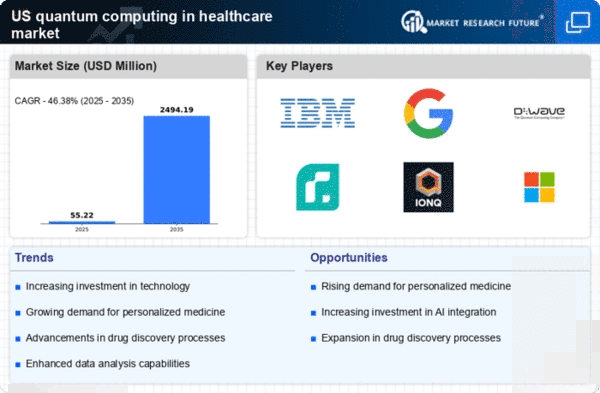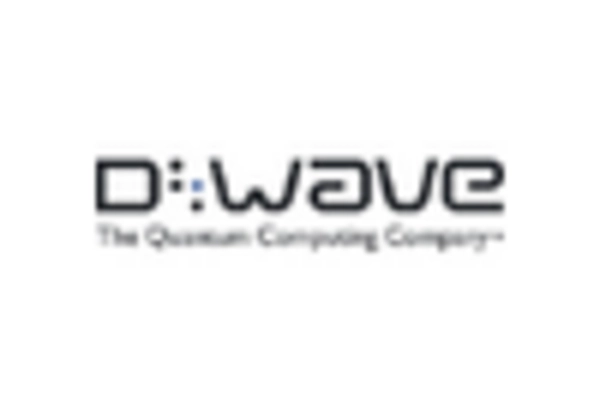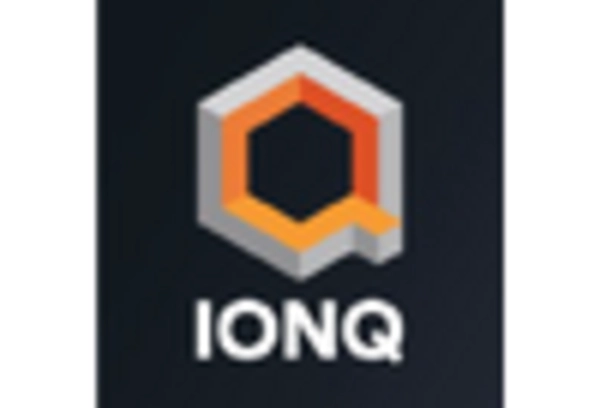Regulatory Support for Quantum Innovations
Regulatory bodies are increasingly recognizing the potential of quantum computing in the healthcare sector, leading to supportive frameworks that encourage innovation. The quantum computing-in-healthcare market benefits from initiatives aimed at streamlining the approval processes for new technologies. This regulatory support is crucial, as it fosters an environment where companies can develop and deploy quantum solutions with greater confidence. Recent policy changes have indicated a willingness to adapt existing regulations to accommodate the unique challenges posed by quantum technologies. As a result, the market is likely to see a proliferation of innovative applications that can enhance patient care and operational efficiency.
Rising Demand for Advanced Healthcare Solutions
The quantum computing-in-healthcare market is experiencing a notable surge in demand for advanced healthcare solutions. As healthcare providers seek to enhance patient outcomes and streamline operations, the integration of quantum computing technologies appears to offer transformative potential. This demand is driven by the need for faster data processing and improved predictive analytics, which can lead to more accurate diagnoses and treatment plans. According to recent estimates, the healthcare sector is projected to invest over $10 billion in quantum technologies by 2027, indicating a robust growth trajectory. The ability of quantum computing to analyze vast datasets efficiently positions it as a critical tool in addressing complex healthcare challenges, thereby propelling the market forward.
Growing Need for Enhanced Cybersecurity Measures
As the healthcare sector becomes more digitized, the quantum computing-in-healthcare market is increasingly focused on enhancing cybersecurity measures. The rise in cyber threats necessitates the development of robust security protocols that can protect sensitive patient data. Quantum computing offers the potential to revolutionize cybersecurity through advanced encryption methods that are theoretically unbreakable. This need for enhanced security is underscored by a report indicating that healthcare data breaches have increased by 30% in the past year. Consequently, investments in quantum technologies aimed at fortifying cybersecurity are expected to grow, thereby driving market expansion and ensuring the integrity of healthcare systems.
Increased Investment in Research and Development
Investment in research and development (R&D) within the quantum computing-in-healthcare market is on the rise, reflecting a commitment to innovation. Major healthcare institutions and technology companies are allocating substantial resources to explore the applications of quantum computing in drug development, genomics, and personalized medicine. This trend is evidenced by a reported increase of 25% in R&D funding in the last year alone, highlighting the urgency to harness quantum technologies for healthcare advancements. The collaboration between academia and industry is fostering an environment conducive to breakthroughs, which may lead to the emergence of novel therapies and treatment methodologies. As R&D efforts intensify, the market is likely to witness accelerated growth and the introduction of cutting-edge solutions.
Collaboration Between Tech and Healthcare Sectors
The quantum computing-in-healthcare market is witnessing a surge in collaboration between technology firms and healthcare providers. This synergy is fostering the development of innovative solutions that leverage quantum computing capabilities to address pressing healthcare challenges. Partnerships are emerging as key drivers of progress, with tech companies providing the computational power necessary for complex healthcare applications. Recent collaborations have resulted in pilot projects aimed at optimizing treatment protocols and improving patient outcomes. As these partnerships continue to evolve, they are likely to accelerate the adoption of quantum technologies in healthcare, ultimately transforming the landscape of medical research and patient care.
.png)















